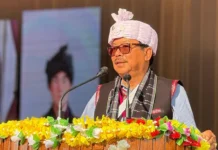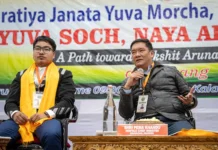[ Ranjit Sinha ]
With the date of the simultaneous assembly and parliamentary elections approaching nearer, electioneering by the political parties is picking up rhythm across Arunachal Pradesh.
A total of 7,94,162 voters, including 4,01,601 women, will seal the fates of 181 candidates for 57 assembly seats and 12 candidates for the two parliamentary segments, at 2,202 polling stations across on 11 April.
With the increase in the number of voters, the total number of candidates has also increased this time.
In the 2014 elections, there were 7,53,170 electorates, including 3,77,272 females, to choose their leaders from among 144 candidates for 49 assembly seats (11 declared uncontested) and 11 candidates for the two parliamentary segments at 2158 polling stations.
Seeing the pre-poll and post-poll political dramas in the state where party ideology becomes secondary to the ‘interests of the state’s development,’ it would not be a bombshell if a particular political party, which is not chosen by the majority of the voters of the state, forms the government after the battle of the ballots. During the last few years, the people of the state have already witnessed the switching of party loyalty many a time and formations of governments under the banner of various political parties.
In a country where ideological contradictions never bother the political parties which have tasted the constitutional power to rule the country, and where the leaders of a political party become ‘chowkidars’ all on a sudden under the given circumstances, and where the grand old party believes in the ideology of ‘Boss is always right,’ one would not wonder if a voter eyes the capability of the individual rather than the party to choose their representative to look into the development activities in their area.
While the political parties are adopting various tactics to beguile the voters, the ideologies of several political parties are also being scanned by conscientious voters this time around.
A citizen, who opted to remain anonymous, said it is very funny for a voter to stand in a queue just to press the NOTA (none of the above) button. “The competent authorities must prescribe the minimum qualities required in a candidate and strengthen the anti-defection law, so that the chosen representatives stick to their political ideologies and principles,” he added.
In a recent online survey, 76.49 percent of the readers (1041) of the daily who took part in the survey said they would vote for the candidate, not the party. Only 17.49 percent of the readers who participated in the survey expressed their willingness to vote on party lines.
A majority of the readers who said they would vote for their chosen candidates believed that political parties in the state are bereft of ideology and the voters like to vote for efficient and capable leaders, irrespective of party affiliation.
“Parties are platforms to deceive the public and loot people’s dreams. Democracy in India needs serious overhauling and maintenance,” one of the participant in the survey said.
If the majority of the voters of the state choose candidates according to their efficiency, capability, experiences and accountability, there is every possibility to play a post-poll decisive role by political parties like the JD(S), the JD(U), the NPP and the PPA in the state.
While there is a discernible ideological vacuum in the leading political parties, the onus is now on the political class and the intelligentsia to ascertain that the politicians and political parties maintain their ideologies, so that the voters keep faith on their elected representatives.
At the same time the voters must take part in the battle of ballots to elect the right candidates for good governance, since the citizens are the real watchdogs of a vibrant democracy.




